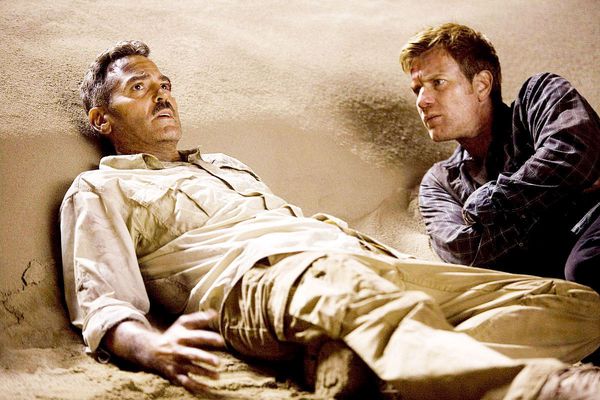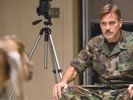Eye For Film >> Movies >> The Men Who Stare At Goats (2009) Film Review
The Men Who Stare At Goats
Reviewed by: Paul Griffiths

The US Army sets up a covert ‘psychic spy’ unit to explore paranormal ways of winning wars and resolving conflict. You’d dismiss it as one of the flakier X-files, if it wasn’t grounded in journalist Jon Ronson’s researched facts.
Loosely grounded, that is. Using Ronson’s non-fictional account of his investigation as a platform, The Men Who Stare At Goats delivers an enjoyable if uneven feel-good swipe at both US military and human endeavours.

Ewan McGregor plays American smalltown reporter Bob Wilton, a nod to Ronson rather than an incarnation, who muddles through life by keeping his head down. But when his wife leaves him for their editor he’s incited to prove that he’s ... something, by heading east to cover the first Iraq invasion in 2003. A local rag rep being sent out as a war correspondent is one of the less incredible leaps in the story.
Treading water in a Kuwaiti hotel, Bob meets Lyn Cassady (George Clooney), another American, ostensibly in town for a refuse-cleaning contract. Bob recalls an interview he once conducted and disregarded with a Gus Lacey (Stephen Root) back home. Gus claimed to be a former US soldier from a top secret psychic spy brigade, ‘warrior monks’, trained to use supernatural powers to overcome the enemy and even kill animals by just staring at them. Lyn was renowned as one of the most powerful. Lyn denies it at first, but finding cosmic coincidence in a doodle on Bob’s pad persuades him to divulge that he’s actually been re-activated for a black ops mission - and he takes the story-chasing journo into the Iraqi desert with him.
Along the way, Bob learns of Lyn’s esoteric training under the tutelage of self-styled guru Bill Django (Jeff Bridges). Django, based on real-life retired lieutenant colonel Jim Channon, set up a sanctioned new age combat battalion, the New Earth Army, exploring non-destructive warfare and training soldiers to free their minds so they could fight wars without harming anyone. Long hair, hippy mantras and drug use were mandatory, ‘remote viewing’ to psi-see others and ‘cloud dispersal’ techniques were the basics. They called themselves, Jedi Warriors.
Peter Straughan (How To Lose Friends And Alienate People) shakes up the narrative structure of Ronson’s book to pleasing effect. The film’s main thrust follows Bob and Lyn in Iraq while regular retreats to the 1980s provide the backstory for Lyn and Bill, with Bob’s voiceover working to hold everything together. However, despite that strong framework, ultimately a lack of character depth or progression and only a lightweight narrative thread at heart leads to a bumpy ride through the desert. Subtle humour and broad comedy abound, though, as Straughan distils Ronson’s droll, anxious irony and some well-timed physical buffoonery serves up the occasional laugh-out loud moment.
The film’s middle section is the most potent as the satirical swipes at US foreign policy come thick and fast. US paranoia at being by out-psyched by the Reds, ‘a super power with superpowers’, financial opportunities in a war-torn country, prisoner mis-treatment, private contractor pillaging, Dubya’s mongering speeches, a pervading sense of losing the way, all butt up against references to Vietnam and the second Iraqi occupation. Sadly, this relished bite is all but lost in the ending’s toothless but merry smile.
The trio of leads all get a fair share of the fun. McGregor gets the snappiest one-liners but he’s working hard against the heavyweights and his twangy, grating accent doesn’t help and doesn’t get any better. That said, given the deliciously salty Jedi references, no one else could have taken the role. Only Harrison Ford can have found being a Stars Wars alumnus so rewarding. Bridges delightfully inhabits another bohemian survivor and pretty much owns most scenes he’s in. Clooney brings his best Coen brothers acting and in truth it’s his charisma, not McGregor’s or his narration, that carries the film along.
Debut director Grant Heslov, long-time Clooney compadre and collaborator (they wrote and produced Good Night, And Good Luck together, Heslov starred in Clooney’s Leatherheads), keeps things simple and slickly unfussy, although there’s a joyful little whorl of layering. Characters staring right at you and trying to run through walls effortlessly parallel your journey through the screen and he plays cleverly with fact, fiction and belief, both within the story and in movie-making. The concept of remote viewing jovially extends to the leads riffing characters from their previous films. Clooney channels Syriana seriousness, Three Kings absurdism and O Brother comedy, Bridges has his immortal Dude drill instructing the New Age Army and, best of all, McGregor squeaks and pops that Obi Wan balloon.
Clooney and Heslov both helped produce and you can discern increasingly familiar Clooney-esque motifs. He clearly wants to make films which he feels have good stories and somehow responsibly prod a contemporary awareness or zeitgeist. The Clooney psi-ops program. Goats should be credited for covering some sobering misdemeanours, but to be glib, when things turn tough on a grand scale, we start to get movies that push the happy buttons and that is the conspicuous intention here. Disappointingly, this means smuggling out the darker satirical elements. Instead we finish with an almost farcical and frothy, rather inconsequential payoff about redemption. Still, for the most part, it’s undeniably feel-good fun.
Reviewed on: 16 Oct 2009

















